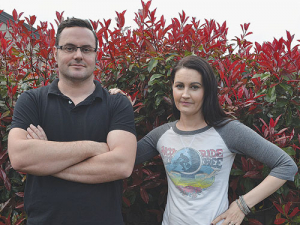Editorial: Having a rural voice
OPINION: The past few weeks have been tough on farms across the North Island: floods and storms have caused damage and disruption to families and businesses.
 Rangiora Jersey breeders Peter and Claire Hansen have been denied compensation after they were blocked from importing four cows from Australia because of the M.bovis outbreak. MPI says the case did not meet the compensation criteria detailed in the Biosecurity Act.
Rangiora Jersey breeders Peter and Claire Hansen have been denied compensation after they were blocked from importing four cows from Australia because of the M.bovis outbreak. MPI says the case did not meet the compensation criteria detailed in the Biosecurity Act.
Farmers who cull animals infected with Mycoplasma bovis without being ordered to by MPI are doing the right thing, says Federated Farmers.
Feds’ general manager policy and advocacy, Gavin Forrest, was commenting after a North Otago farmer went public with fears he might not be properly compensated for 400 animals he voluntarily culled after M. bovis was found on his farm.
Kerry Dwyer runs a calf-rearing business near Maheno, in North Otago, buying in four-day-old dairy calves and raising them to about 100kg. He was caught up in the M. bovis outbreak after buying calves from nearby farms of the Van Leeuwen Group, where the disease was first identified last year.
Dwyer is also acting as an informal spokesman for several ‘downstream’ farmers in the district who had received animals from him but did not want their names public.
He declined to be interviewed by Rural News but told the Otago Daily Times his claim of about $180,000 was solely for the animals slaughtered and he believed it was a fair valuation.
It did not cover loss of income or other costs.
“I want a fair deal, but I feel we’re not going to get a fair deal. They are going to knock us and we’re not going to accept that,” he said.
Without compensation he could not afford to restock.
Forrest says MPI could “technically” argue they weren’t liable to pay compensation if the cull wasn’t done under their direction. However, he believes culling was the right thing to do.
“That’s something the industry should have a view on, and I think our view would be that he did the right thing and should be compensated for what he did.”
“In fact he probably saved them a helluva lot of money in the end, because that was probably about the least-cost avenue for those calves.”
Dywer’s case became public shortly after Rangiora Jersey breeder Peter Hansen revealed he’d been denied compensation after he was blocked from importing four cows from Australia. MPI said his case did not meet the compensation criteria detailed in the Biosecurity Act.
Forrest acknowledged that live animal imports are the highest-risk pathway, but in considering compensation the letter of the law was not the principle at stake.
“It was important to incentivise people to speak up and know they won’t be disadvantaged.”
He says Federated Farmers is disappointed at how long compensation was taking.
“The door is now open for the compensation to be paid and I don’t see any reason why it shouldn’t be,” Forrest says.
Testing on track
MPI says the national bulk milk survey seeking to determine the overall spread of Mycoplasma bovis remains on track to be completed by the end of March. So far at least 55% of farms have submitted their second test of three and 16% of farms have completed all three rounds.
MPI says any positive or suspect samples will be followed up urgently.
All farms where the disease is not found will receive a ‘not detected’ report from the dairy company they supply. This will happen once all three rounds have been completed for that farm, normally about 10 days after the last sample.
At March 14 the number of confirmed infected properties stood at 27.
The two most recent were a small calf-rearing farm in Southland and a dairy grazing farm in upper Waitaki -- both forward traces from a known infected property.
The number of farms under a restricted place notice stood at 47.
The World Wide Sires National All Day Breeds Best Youth Camp Best All Rounder plaudit has become family affair, with 2026 Paramount Cup winner Holly Williams following in her sister Zara's footsteps.
DairyNZ is giving New Zealand farmers a unique opportunity to gain hands-on governance and leadership experience within the dairy sector.
Herd improvement company LIC has posted a 5.2% lift in half-year revenue, thanks to increasing demand for genetics.
According to the latest Fresh Produce Trend Report from United Fresh, 2026 will be a year where fruit and vegetables are shaped by cost pressures, rapid digital adoption, and a renewed focus on wellbeing at home.
The Roar is a highlight of the game hunting calendar in New Zealand, with thousands of hunters set to head for the hills to hunt male stags during March and April.
OPINION: The past few weeks have been tough on farms across the North Island: floods and storms have caused damage and disruption to families and businesses.